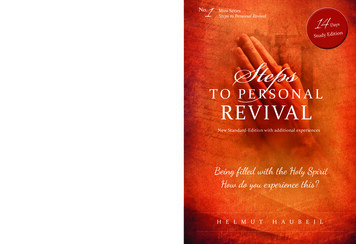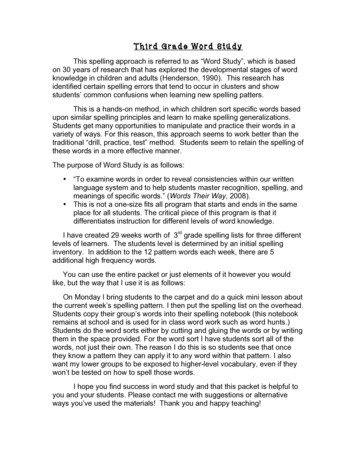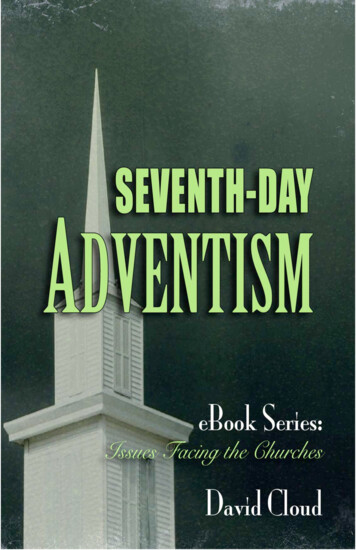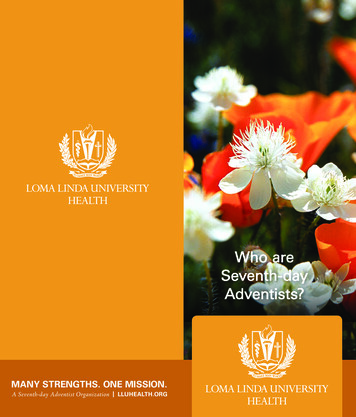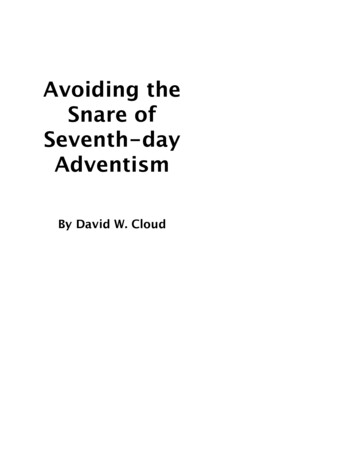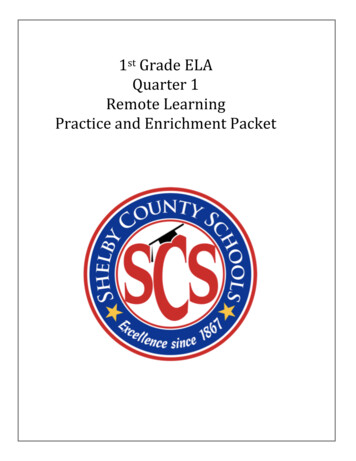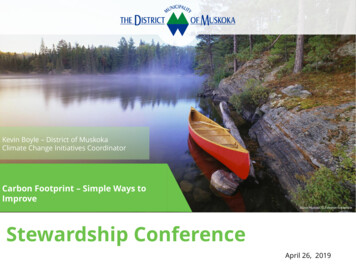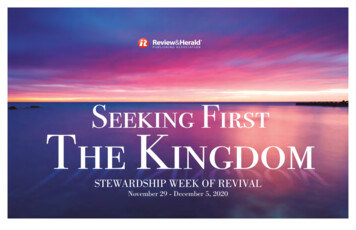
Transcription
STEWARDSHIP WEEK OF REVIVALNovember 29 - December 5, 20201TA B L E O F CO NTENTS EEK FI R S T TH E K I N G D O M
Copyright 2020 by the General Conference Corporation of Seventh-day Adventists All rights reservedPublished by Review and Herald Publishing AssociationWritten by: Ioan Campian-TâtarEdited by: Sandra BlackmerCover: Synesthezia Emotional Marketing, LLCLayout and Design: Johnetta B. FlomoThis material may be translated, printed, or photocopied by any Seventh-day Adventist entity without securing further permission. Republished documents must include thecredit line: “Stewardship Ministries, General Conference of Seventh-day Adventists, used by permission.” Selling this work for profit is prohibited.Unless otherwise indicated, all Scripture taken from the New King James Version . Copyright 1982 by Thomas Nelson. Used by permission. All rights reserved.Holy Bible, New International Version , NIV Copyright 1973, 1978, 1984, 2011 by Biblica, Inc. Used by permission. All rights reserved worldwide
DAYDAYDAYDAYFromSadness toSingingBackto BethelStewardFor TheEnd TimeTable of ContentsDAYNo CompromiseIn BabylonDAYTheDelight ofKindness InReal LifeDAYDAYMissionaryIn SamariaHealingTimeThe GiftOf LoveIntroduction 05 Commitment Cards 04 About the Author 853TA B L E O F CO NTENTS EEK FI R S T TH E K I N G D O M
4CO M M ITM ENT C A R DSS EEK FI R S T TH E K I N G D O M
IntroductionAs we approach the end of the year,we invite you to pause and reflect onsome major life issues. From a globalperspective, for many of us, 2020 will godown in history as a terrifying and disruptive year. The events took us by surprise,though we are attentive to the unfoldingof biblical prophecies. A significantamount of energy was mobilized to adaptto new realities and to shift into a protective mode. Too much for just one year!Going through such a whirlwind has thecapacity to drift us away from our anchorpoints. A spiritual checkup is necessaryfor our well-being.The Stewardship Revival Week, writtenby Pastor Ioan Câmpian Tâtar, the Stewardship Ministries director of InterEuropean Division, serves as an instrumentfor a thorough introspection exercise. He5I NTRO D U C TI O Nprobes into some Bible stories and leadshis readers to ask the fundamental lifequestion: Am I seeking God first in thenitty gritty of my existence?This year’s World Stewardship Emphasis Day will be held on December 5,2020. The week prior is recognized asStewardship Emphasis Week, a time whenAdventist stewardship leaders around theworld will lead out in the morning worshipservice and conduct afternoon seminars;encouraging members to put God first inall aspects of their lives.We encourage each local church toplan and organize the “God-First” week ofprayer to nurture God’s stewards for theirjourney to eternity. The GC Stewardshipteam prays that this program will serve asa refreshing and refilling stop for each ofus.S EEK FI R S T TH E K I N G D O M
DAYFrom Sadnessto Singing6FRO M SA D N E S S TO S I N G I N GS EEK FI R S T TH E K I N G D O M
DAY 1 From Sadness to Singing“For this child I prayed, and the Lord has granted me my petition which I asked of Him” (1 Sam. 1:27).time of the judges. It was one of the mostof believers, the local church, or even thetroubling periods in the history of thewrong step, and Elkanah’s case is no ex-church as a whole should look. We wantpeople of Israel. The moral and spiritualception.church members to be eager to studydeterioration is obvious; this period canthe Word of God, like those in Bereabe called the Dark Ages of the Old Testament.A Family and A Nation In CrisisThe first two chapters of the book ofThe narrator presents the tense re-1 Samuel present the real life, withoutlationships within this family. Exactlyretouching, of a family of those times.when they most needed a joyful atti-Elkanah gathers all the members of histude for their worship to become a realfamily every year and goes to Shiloh, theheartfelt experience, everything turnedspiritual and religious center of Israel, “toto bitterness, strife, and disappointment.worship and sacrifice to the Lord (1 Sam.Elkanah had two wives—Peninnah and1:3). Seeing the whole family heading toHannah—and there was much tensionthe place of public worship was some-between the two of them. Even at the(Acts 17:11), with an active prayer life andthing to be appreciated in those days, asplace of worship, Peninnah continued toinvolvement in mission. Of course, a livingit is today.denigrate Hannah because Hannah wasand spiritually powerful church is madeInstead, the reality beyond the ap-childless in words that hurt her soul (1up of consecrated families, families thatpearance was different. According to theSam 1:6). The only thing Hannah couldstudy the Word of God and make a dailycustoms then, if a family did not havedo was to withdraw from the celebrationhabit of praying to and praising Him.children, some would take a second wife.in tears. A family in spiritual and rela-All such examples in the Bible speak oftional crisis actually showed what wasI invite you to go in your mind to the7the negative consequences of such aWe all have an image of how a familyFRO M SA D N E S S TO S I N G I N GS EEK FI R S T TH E K I N G D O M
happening at that time on a differentand the lack of children was a shame inscale, at the level of the whole nation.The strongest proof that God does nother culture, a sign of divine displeasure.Pilgrims from all over the country camegive up on us is the book of Judges, theLittle by little, however, this dream of hersto Shiloh for one reason, to worship. Thosebooks of Samuel, the entire Bible, anddied and had become the object of Pen-there who should have led all the peopleespecially the cross at Golgotha. God isinnah’s mockery. This time, though, whenin the holy act of worship “did not knowworking, but He chooses people to carryPeninnah mocked her, Hannah did some-the Lord” (1 Sam. 2:12). This is the mainout His plans.thing completely unusual. She rose fromreason for the moral and spiritual crisisHe chose Hannah, an ordinary womanthe table, not to mourn in solitude, but tothat the people of Israel were experienc-who was not a prophet like Deborah orcarry the burden of her soul before Goding. Compromise led to conflict and chaos.Hulda, but who had a spiritual sensitivityin prayer. The expression repeated manyExternal enemies attacked the nation (1and fear of God. Her name appears ontimes regarding this event is, “before theSam. 4-7), and corruption prevailed within.the pages of the Holy Scriptures alongLord” (1 Sam. 1:12). “Before the Lord” sheThe sons of Eli, the high priest, were guiltywith the great men of faith for the simpleprays and cries; she makes a promise;of a great sin because they “abhorredreason that she prayed. As a result of herhere, she stays for a long time, and maybethe offering of the Lord” (1 Sam. 2:17).prayer, the history of the people of Israelshe would have stayed longer if she hadFrom this sad story, we see thatturned and took a new direction. If shenot been interrupted by Eli, the highthe devil’s strategy is to ruin God’shad not prayed, would we be talking todaypriest.children. When worship is absent orabout Samuel, the prophet and judge,This expression is one consecrated inbecomes a failure at a personal, family,whose leadership resulted in real moralthe Old Testament; the worship had toor church level, the devil’s victory isand spiritual reform? He is the one whotake place before the Lord. God and notassured. For this reason, “the word ofensured the transition from the period ofman should be in the center of worship.the Lord was rare in those days; therethe judges to the monarchy. He wept forWhat a need we have today of such awas no widespread revelation” (1 Sam.Saul, but he had the privilege of anointingworship, in which singing, praying, preach-3:1). Like Hannah, who could not haveDavid, a man “after His own heart” (1 Sam.ing, or any other element of worship ischildren, Israel had become a fruitless13:14), as king.done to the Lord and not for other people.people,8God Still WorksabarrenandfruitlessFRO M SA D N E S S TO S I N G I N Gland.Hannah longed to become a mother,Hannah asked God for a child, andS EEK FI R S T TH E K I N G D O M
And she said, “O my lord! As yoursoul lives, my lord, I am the woman who stood by you here, prayingto the Lord. For this child I prayed,and the Lord has granted me mypetition which I asked of Him.Therefore I also have lent him tothe Lord; as long as he lives heshall belent to the Lord.” So theyworshiped the Lord there.1 Samuel 1: 26-289FRO M SA D N E S S TO S I N G I N GS EEK FI R S T TH E K I N G D O M
the reason she asked for this was clearlya sacrifice without the intercession of theIn special words, Ellen White expressesexpressed. It was not for the mockery e or to have the shame of infertilityBut the promise, or the vow, was then“When separated from her child, theremoved, but to give God a gift, the mostand continues to be today somethingfaithful mother’s solicitude did not cease.precious gift, a child. Hannah knows thatdone in direct relationship with God,Every day he was the subject of hera true relationship with God, like anywithout the intercession of any person.prayers. Every year she made, with herrelationship, develops not only by askingTrue worship costs. It costs time, prepa-own hands, a robe of service for him;but also by giving. This is why her prayerration, offerings, and tithe. David saidand as she went up with her husband tois unique in the Bible and becomes a vowhe could not bring God “a sacrifice thatworship at Shiloh, she gave the child this(1 Sam. 1:11). Hannah’s gift, just like Mary’swould cost him nothing” (2 Sam. 24:24).reminder of her love.”1gift (John 12:1-8), is so precious becauseBut, most of all, worship does not costmakes promises to God, but she alsoit is a gift of sacrifice. She promises andus, it costs God, by giving His Son. Thekeeps her word! (1 Sam. 1:26, 27).fulfills it with all her heart.One who first promised an offering is notHannah not onlyus, but God Himself (Gen. 3:15). Worshipwithout offering is not worship!A Promise Before OwningStaying“beforetheLord,”Hannah’s promise is the promise ofHannahfaith and love. Ellen White tells us that inmakes a promise to God that she willthose times, “such a prayer could rarelyreturn the child even before having him.be seen. Eli’s reaction is obvious in thisA vow is an initiative of the worshiper; itregard” (1 Sam. 1:14). I believe that onis an act of worship. During the Old Tes-her behalf, God could say the words: “Otament period, most of the elements ofwoman, great is your faith!” (Matt. 15:28).public worship were conditioned by theHannah promised that the child wouldpresence of priests. One could not offerbe “consecrated to the Lord” (1 Sam. 1:11).110Hope For Difficult TimesThere are many precious truths that weEllen G. White, Christian Education, p. 214.FRO M SA D N E S S TO S I N G I N GS EEK FI R S T TH E K I N G D O M
Questions:can learn from Hannah’s example. We canthrough prayer, we recognize His sover-see how God can use the negative expe-eignty; nothing is out of His control. Thereriences in our lives to create somethingis hope for times of crisis in the family, inhistory of a nation through God’s in-great. He can use the most painful trials tothe church, and in the whole world. Wetervention, what could happen todayteach us what trusting in Him means.have a God who takes care of and wantsHannah learned to trust God in allto work for those who trust Him. Hannah’sthose things that were beyond her powersong (1 Sam. 2:1-11) talks about this. Whento control. Now, as I write down theseyou see God’s intervention, you cannotthoughts (April 2, 2020), almost thestop singing!1.If a single prayer could change theif we pray?2.Standing “before the Lord,” what arethe things we promise, personally, inthe family or as a church?3.whole world is in quarantine, worriedAre there ways through which we canalso express our hope and trust inabout what could come next. The fear ofGod today?contamination and of what will happen4.Why do you think Hannah was abletomorrow has covered all humanity. Forto fulfill her vow and bring her pre-Hannah, suffering and the trial she wascious offering when she realized thegoing through was a call to prayer andcorrupt spiritual condition of religioustrust in God. She prayed, and when sheleaders at that time?left the place of prayer, “her face was nolonger sad” (1 Sam. 1:18). On her face therewere no more tears, but a smile of joy.Through trust and hope before the Lord atI Promise:Shiloh, Hannah found peace even beforeTo SET APART the first moments ofreceiving an answer to her prayer. Imagineeachday to commune with the Lord-Elkanah’s home the day Hannah saw thethrough PRAYER, the STUDY of the Bible,divine intervention and the answer to herSpirit ofProphecy and the Sabbath Schoolprayer in her life—when Samuel was born!lesson, and in FAMILY WORSHIP.When we come “before the Lord”11FRO M SA D N E S S TO S I N G I N GS EEK FI R S T TH E K I N G D O M
c h i l d r e n ’s s to ryJohnny’s Faithful Prayerserious financial crisis and struggling forshe had used the last flour to cook thattheir daily needs. The father had lost hisday’s bread. With a worried expression,job shortly before winter, and he had nothe father told her that in a few days they“Assuredly, I say to you, whoever doesmoney to cover the needs of his family.would also run out of wood to set thenot receive the kingdom of God as a littleHis wife and two young children did notfire in the stove, and he was concernedchild, will by no means enter it” (Markcomplain, even as the amount of foodbecause they expected the winter’s low10:15).became much less each day. The mothertemperatures to last a few more weeks.Jesus loves children in a special way,would cook bread from the little flour theyLittle Johnny, who was just 4 years old,and He always likes to answer their simple,had left, and they rarely had anything elselooked at his parent’s worried faces andhonest prayers. There is a true story aboutother than that on the table, until oneunderstood that the situation was serious.a low-income family going through amorning, when she sadly announced thatWhen his father called him and Sarah, his12FRO M SA D N E S S TO S I N G I N GS EEK FI R S T TH E K I N G D O M
little sister, who was only 2, to come to thedidn’t even blink as his mother opened upevening family worship, Johnny asked ifthe package and pulled out a big bag ofhe could say the prayer. “Dear Jesus,” hepotatoes and another bag filled with whiteprayed, “thank You for taking care of us!flour.Please send Daddy some wood for theWhen she pushed the empty box away,fire, some flour for Mommy to cook, andJohnny looked at her, and with eyes full. . .”—after he paused a few seconds, heof hope, he said: “Mommy, can you pleaseadded: “. . . and two bananas for Sarahcheck one more time for our bananas?”and me. Amen!”His mother’s heart melted, and she feltWhen his mother put him to bed thatlike crying when she realized his faithfulevening, he told her: “I can’t wait to getexpectation. “I’m sorry,” she said as sheJesus’ gifts!” His mother smiled as shehugged him, “there is nothing else in thekissed him good night, wishing she had hisbox, Johnny.” “It’s OK,” Johnny replied.strong faith and confidence.“Maybe He will send another angel laterThe next morning, the father decidedBut as the mother went into the kitchenlend him some money for the family’sto pour the flour into the flour box, sheneeds. But when he walked out the door,found hidden inside the flour two—yes,he saw in front of the house a basket con-exactly two—bananas. They had beentaining some chopped wood, and on theput inside the flour so the potatoes coulddoorstep there was another big package.not smash them. With tears in her eyes,He immediately called his wife to tell herMother called little Johnny and Sarah andthe great news. Johnny, who had alreadygave them their much-awaited bananas!woken up and was feeling hungry, as he“I told you, Mommy,” Johnny said with ahad gone to bed the night before withoutsparkle in his eyes. “I knew Jesus hears alleating anything, ran outside in a hurry. Heour prayers. He just has unique ways toFRO M SA D N E S S TO S I N G I N GQuestions:1.2.3.Why do you think children arespecial to Jesus?Can we trust God even when Heanswers our prayers differentfrom how we expect?Do you have an experienceyou can share of when God answered your prayer?with the bananas.”to go to a friend’s house to ask him to13answer them!”S EEK FI R S T TH E K I N G D O M
DAYThe Delightof Kindness inReal Life
DAY 2 The Delight of Kindness in Real Life“What is desired in a man is kindness” (Prov. 19:22).Ben Maxson shared a discussion heMaxon said, then continued: “I supposeferings; you can express love by serving,once had with someone while travelingthere are many Christians on this plane,even listening. What is that fundamen-by plane. At the time, he was directorbut are they all true Christians?” Thetal characteristic through which I canof the Stewardship Department at theinterlocutor’s reply came immediately, “Itransmit love, both to those close and toGeneral Conference, and the interlocu-don’t think everyone is a true Christian.”those I might meet only once in life? We“Even less-religious people have awill find the answer in the love anthem,picture of what it means to be a truewhose author is the apostle Paul. ‘Love is’Christian,” said Maxson. “My full-timewrites the apostle, ‘full of kindness’ [1 Cor.dutypractice13:4]. Through the kindness expressedChristianity. To be a faithful steward, ortoward others, we show that we love Godadministrator, involves taking seriously[1 John 4:10, 11].”istohelppeopletothe commandment that Jesus Christ saidwas the greatest: “‘You shall love theLord your God with all your heart, withKindness in Little Things and Bigall your soul, and with all your mind.’ ThisDecisionstor asked him about his occupation. Hisis the first and great commandment. AndThe Holy Scriptures speak of God’sanswer was: “I am a pastor, responsiblethe second is like it: ‘You shall love yourgoodness. God expects this goodnessfor our church’s stewardship depart-neighbor as yourself’” (Matt. 22:37-39).to become visible, tangible. There isment.” Surprised, the person continued“Maybe someone asks: ‘But still, howonly one way to make this a reality:with a new question: “What does thatcan love be defined? Even in the Bible,through His children. We have in the Oldmean?” “It’s not an easy thing to explainlove is expressed in so many ways!’”Testament a book in which goodness isit to someone unfamiliar with the Bible,”Maxson said. “You can love by giving of-present and visible. It is the book of Ruth,15TH E D ELI G HT O F K I N D N E S S I N R E A L LI FES EEK FI R S T TH E K I N G D O M
the only book in the Bible named after aRuth, have fulfilled their family obligationsin the case of the relationship betweenwoman who is not part of the people ofand are now free; they have no obligationPaul and Timothy (1 Tim. 1:1-5). There areIsrael.to Naomi. Naomi clearly and logicallymany cases in which children express theirargues that she has no way of assuringattachment to their parents. But for athem a future.daughter-in-law to show such an attitudeWe can go back in history, thousandsof years ago, and get acquainted withcustoms and laws that have governedsocial and religious life at that time.Ruth, on the other hand, resists. Shedoes not want to go home, and she ex-toward her mother-in-law is somethingrarely encountered.presses one of the most beautiful state-The narrative does not show why Ruthto the land of Moab, and finally endsments in the Bible: “Entreat me not tochose to make such a decision whenin Bethlehem. Because of the drought,leave you, or to turn back from followingNaomi repeatedly tells her that she hasElimelech’s family decides to move toafter you; for wherever you go, I will go;nothing to offer. There appears to be onlythe land of Moab for a while. In just tenand wherever you lodge, I will lodge; yourone answer: Naomi’s kindness. Throughyears, Naomi, Elimelech’s wife, buriespeople shall be my people and your God,this kindness, Ruth was able to understandher husband, witnesses the marriage andmy God. Where you die, I will die, andGod’s kindness. That is why she can say(later) the death of her two sons, and isthere will I be buried. The Lord do so tothese words: “Your God will be my God.”left with her two daughters-in-law, Orpahme and more also, if anything but deathThe action begins in Bethlehem, movesand Ruth. Many things can happen in justparts you and me” (Ruth 1:16, 17).In Hebrew, the word “hesed” has astrong relational connotation, very rich inten years! Naomi decides to return home,These simple but very profound wordsmeaning. It is difficult to translate, and itand the two daughters-in-law accompanyare expressed in a covenant languageexpresses many of God’s attributes. Thisher. Three times these widowed womenthat shows love and faithfulness. Here isword can mean love, mercy, kindness,stop and cry. It’s the only thing they canthe essence of personal loyalty. Ruth’sgrace, devotion, faithfulness, and loyalty.do in this situation. Three times Naomiattachment is voluntary, a free choiceAll these qualities motivate a person toinsists that her daughters-in-law returnwithout expectation of anything in returnact for the benefit of another withoutto their own homes, and Orpah finallyfrom Naomi. Often in the Bible, we en-expecting anything in return. Naomi usesdecides to go home to her people and hercounter the image of parents who lovethis word in its active form, under theparents. These young women, Orpah andtheir children, even spiritual children, asvariant of the verb in addressing the two16TH E D ELI G HT O F K I N D N E S S I N R E A L LI FES EEK FI R S T TH E K I N G D O M
“Entreat me not to leave you, orto turn back from following after you; For wherever you go, Iwill go; And wherever you lodge,I will lodge; Your people shall bemy people, and your God, myGod.Where you die, I will die, andthere will I be buried. The Lord doso to me, and more also, if anything but death parts you and me.”Ruth 1:16, 1717FRO M SA D N E S S TO S I N G I N GS EEK FI R S T TH E K I N G D O M
daughters-in-law: “The Lord deal kindlyand still are some of the most commonwith you, as you have dealt with thoseproblems. Our image of God can be af-Ruth asks Naomi’s permission to go towho have died and with me” (Ruth 1:8),fected when we are overwhelmed withglean heads of grain from the field of theor regarding Boaz, “Blessed be he of thepain. We see this in Naomi’s words, “Theone who will be willing to show kindnessLord” (Ruth 2:20).Almighty has afflicted me” (Ruth 1:21).(hesed) (see Ruth 2:2). This time, we meetRuth, unlike Naomi, speaks less; but inNaomi is realistic; she proposes a changethe third character in the book of Ruth,deeds, she demonstrates what kindnessof name: “Call me Mara (Bitterness).” Butnamely Boaz. From the narrator’s account,(hesed) means, as the narrator comments,remember, she does not show bitterness;we can learn that Boaz is not just a rich“But Ruth clung to her” (Ruth 1:14). Sheshe calls bitter only the circumstances sheman with a certain social status. He is thedoes not preach about kindness; shehas gone through. Naomi continues toone who treats his workers with a lot ofshows what kindness is.remain Naomi (Pleasant); that is why Ruthrespect, and by greeting, he blesses them.chooses to stay in her company. NaomiThe greeting was and is still present indid not lose faith in the one whom Davidevery culture, even if expressed throughwould later call “the Father of the father-different words or gestures. The purposeless, a defender of widows” (Ps. 68:5).of greeting is to establish relationships;Kindness to Strangers, Widows, and thePoorNaomi’s arrival with Ruth in BethlehemRuth, perhaps a little more optimistic,could not pass unnoticed because “all theis not just a poor widow like Naomi. Shecity was excited” (Ruth 1:19). All the in-is also a foreigner. Twelve times her namehabitants of the town had the opportunityappears in this narrative, and five timesto know the painful experience that thisshe is called Ruth the Moabite. Maybe thisfamily went through. Naomi was not onlyrepetition is always to remind us that shewithout a husband, but she also had lostis not part of the chosen people. She isher two sons. A widowed woman withouta foreigner. But God also loves strangers,a family to support her at that time waswhich is why He commanded His peoplein a miserable situation. Loneliness, hope-not to gather everything from the field,lessness, and emotional suffering werebut “to leave for the poor and the strang-18TH E D ELI G HT O F K I N D N E S S I N R E A L LI FEer” (Lev. 19:10).it is the first thing we do when we meetS EEK FI R S T TH E K I N G D O M
someone. By greeting, we say: “You arehelp us to know the deep truths that areimportant to me.” It is the simplest wayrevealed. We need familiar images to seewe can express kindness. Ruth is over-what cannot be seen with the physicalwhelmed by Boaz’s appreciation for theeye. We better understand God’s good-way she treated Naomi, her mother-in-law.ness when we read in the Holy Scriptures“Then she said: ‘Let me find favor in yourthat He is like a mother who cannot forgetsight, my lord; for you have comforted me,her child (Isa. 49:15), or like a fortress, aand have spoken kindly to your maidser-place of “refuge” (Ps. 91:2).vant’” (Ruth 2:13).Boaz uses another image in his wel-What an extraordinary power the rightcoming words toward Ruth, “May thekingdom of priests” (Ex. 19: 6). They them-words can have at the right time. ManyLord repay your work, and a full rewardselves should become protective wings forpeople around us do not expect muchbe given you by the Lord God of Israel,others, as was Boaz. Ellen White states:from us, maybe just a greeting, appre-under whose wings you have come for“All who, like Rahab the Canaanite, andciation, or encouragement. With simplerefuge” (Ruth 2:12). The metaphor of aRuth the Moabitess, turned from idolatrywords, we can welcome them into ourbird’s wings protecting its little ones isto the worship of the true God, were toworld. But if they remain for us the strang-used by God Himself (Ex. 19: 4) regardingunite themselves with His chosen people.er, the minority, the poor, or anything elseHis people. Boaz tells Ruth that the wingsAs the numbers of Israel increased theythat may create barriers or distancing, theof God’s providence, mercy, and kindnesswere to enlarge their borders, until theirmessage of Jesus from His last sermon ishave spread over her, a stranger.kingdom should embrace the world.”for others, not for us (Matt. 25:31-46).“Under His Wings”The Bible uses many metaphors that1191God also explains why He did this toThe wings are not like the fortress, thethe people of Israel: not because theyimage of safety, built of stone. The wingsdeserved it, but because in His plan, Heexpress loyalty and love, but also vulner-wanted them to show the same kind-ability. That is why God’s goodness is bestness to all nations. “You shall be to Me aseen not in the providence of sometimesEllen G. White, Christ’s Object Lessons, p. 290.TH E D ELI G HT O F K I N D N E S S I N R E A L LI FES EEK FI R S T TH E K I N G D O M
painful life circumstances, but in Golgotha.even today, what true religion is. Theythere wouldn’t have been an Obed, aThis is where we can all be protected fromgave us true Christianity, and showed usDavid, . . .the greatest evil in this world, sin.what a steward is: an administrator, onewhat can be greater than to be full ofto whom in that great day Jesus will say,kindness, to be like Jesus?Throughout the book, the narratorrefers directly to God only twice: at theand the rest is history. And“Well done, good and faithful servant.”beginning of the book of Ruth, when itThe only way people can see God’ssays that God “had visited His people bykindness is by the example of His children.giving them bread” (Ruth 1:6), and in theThe women of the city of Bethlehem areToend, “the Lord gave her conception, andconvinced of one thing, that Ruth trulygrowing in faithfulness, forgiveness andshe bore a son” (Ruth 4:13). Theologiansloves Naomi. And after Ruth married Boazloving byprinciple.call this technique inclusion. If somethingand bore him a son, they said to Naomi:is said at the beginning of a report and“And may he be to you a restorer of lifethe same idea appears again in the end,and a nourisher of your old age; for yourit means that the whole narrative is dom-daughter-in-law, who loves you, who isinated by the same truth. In our case, thebetter to you than seven sons has bornetheme that dominates the book of Ruth ishim” (Ruth 4:15). How happy Naomi mustthat God provides bread and life. He is thebe, holding the baby in her arms. “Nowsource of everything we have, even ourshe can no longer say, ‘I went out full,existence.and the Lord has brought me home againNaomi, Ruth, and Boaz always expressthis truth in their addresses. On the otherempty’” (Ruth 1:21).WhatdoweadmireaboutRuth,hand, they do not remain at the level ofthe Moabite? There are many things topious expressions, clothed in a religiousadmire, but maybe most of all, her choice,language. Through their behavior, attitude,courage, and determination. Ruth remainsand sacrifice, each one showed those inan example of how big life decisions areBethlehem, their future generations, andmade. Humanly speaking, without Ruth,20TH E D ELI G HT O F K I N D N E S S I N R E A L LI FEI Promise:IMPROVEmyRELATIONSHIPS:Questions:1. God is a God of relationship. Towhat extent are relationships a priority in your life?2. How can the book of Ruth inspireyou to
This material may be translated, printed, or photocopied by any Seventh-day Adventist entity without securing further permission. Republished documents must include the credit line: “Stewardship Ministries, General Conference of Seventh-day Adventists, used by
